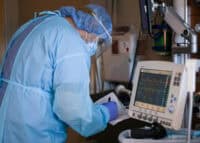
It’s another disappointing day for one of America’s top biotech companies. Gilead Sciences Inc.’s (NASDAQ: GILD) selonsertib failed to improve fibrosis in the Phase 3 STELLAR-4 trial, and its shares traded lower as a result. While this is more bad news for Gilead, it may prove to be great news for Intercept Pharmaceuticals Inc. (NASDAQ: ICPT).
Tuesday’s review of top analyst upgrades and downgrades showed that multiple analysts had downgraded Gilead after the disappointing news. Its shares closed up 0.2% at $67.62 on Monday but were down 4.2% at $64.79 early Tuesday. Wells Fargo downgraded Gilead to Market Perform from Outperform and cut the target to $68 from $89. Citigroup downgraded it to Neutral from Buy and cut its target to $75 from $100.
Merrill Lynch only has a Neutral rating on Gilead, and the firm feels the stock may continue to trade lower with more disappointment. As for the future, with a new CEO coming shortly, the Merrill Lynch team said:
Given the lack of placebo control, small number of patients, and the relatively short 24-week duration of the Phase 2 trial, we are not that surprised by the disappointing STELLAR-4 results. However, potential upside from the STELLAR-4 has probably contributed to the recent run-up in stock. As such, we would expect GILD to trade down on the news… With another loss of late stage pipeline asset, investors likely will demand M&A to reinvigorate long-term growth. We maintain Neutral awaiting new CEO’s strategy when Daniel O’Day takes the helm on March 1.
Credit Suisse reiterated Intercept as Outperform with a $167 price target (versus a $117.34 prior close), and the firm only initiated coverage at the end of July. It noted that Gilead’s selonsertib failure to improve fibrosis removes the largest competitive threat for Ocaliva. Tuesday’s report said:
Gilead’s selonsertib failed to improve fibrosis in the phase III STELLAR-4 trial, with improvement rates of only 14.4% and 12.5% for the 18mg and 6mg doses versus a placebo rate of 12.8% in patients with F4 fibrosis levels (cirrhosis) with non-alcoholic steatohepatitis (NASH). Investors have been skeptical of selonsertib’s potential to succeed in NASH, but the degree to which the drug failed this trial (P values of 0.56 and 1.0) is surprising. We see no negative read-through to Intercept’s Ocaliva as the drugs work via different mechanisms of action. This result supports our Outperform thesis that Ocaliva will lead the NASH market, with serious competition at least 4-5 years away.
On February 4, Raymond James raised Intercept to Strong Buy from Outperform. And on January 28, Jefferies reiterated its Buy rating and raised its target price to $150 from $135.
As of last look, Intercept had a consensus target price of $144.47 and a $3.5 billion market cap. The Thomson Reuters consensus estimate projected just $179 million in 2018 sales, and that is expected to rise to $255 million for 2019.
Travel Cards Are Getting Too Good To Ignore (sponsored)
Credit card companies are pulling out all the stops, with the issuers are offering insane travel rewards and perks.
We’re talking huge sign-up bonuses, points on every purchase, and benefits like lounge access, travel credits, and free hotel nights. For travelers, these rewards can add up to thousands of dollars in flights, upgrades, and luxury experiences every year.
It’s like getting paid to travel — and it’s available to qualified borrowers who know where to look.
We’ve rounded up some of the best travel credit cards on the market. Click here to see the list. Don’t miss these offers — they won’t be this good forever.
Thank you for reading! Have some feedback for us?
Contact the 24/7 Wall St. editorial team.



